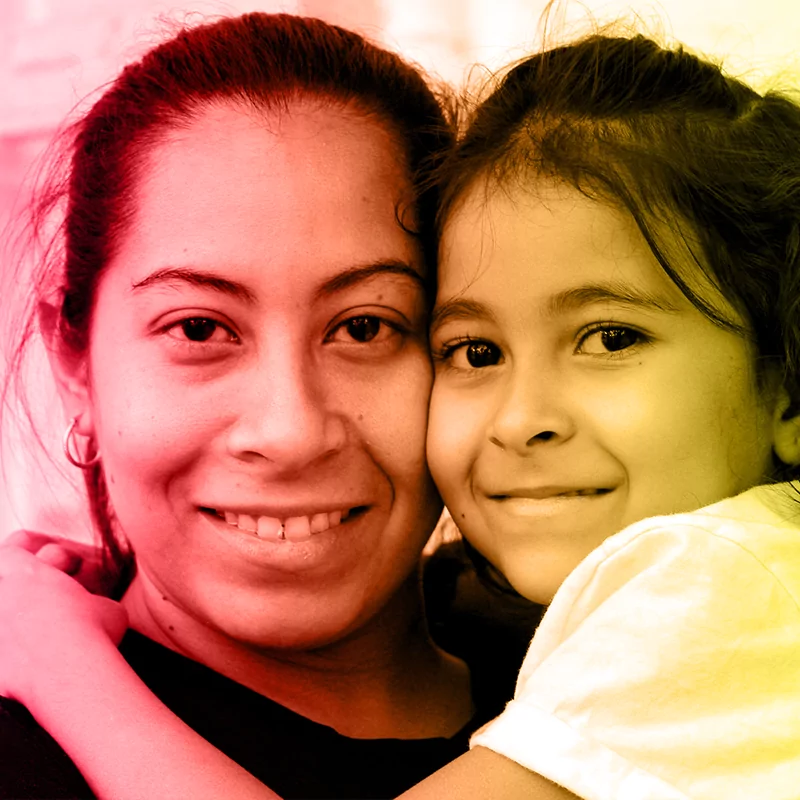Five Tips for Talking About Immigrant Justice
by Charlie Sherman, Manager of Narrative Strategy, and Britney Vongdara, Research Coordinator, The Opportunity Agenda
Time and time again, the script repeats: unfulfilled promises of immigration reform give way to divisive and dehumanizing rhetoric that scapegoats immigrants seeking a better life in this country. The messages and images we see on everything from door-knocking flyers to news segments depend on a simple idea: that preying on our fears and anxieties will keep us divided.
By naming the script, however, we can change it over time.
The Opportunity Agenda has been working with immigration advocates and organizers from Iowa and Michigan to New York to seed new, pro-immigrant narratives both regionally and nationally. The project is based on our three-phase research study—supported by HIT Strategies and Worthy Strategy Group— which explored how flawed assumptions about the economy and racial prejudice against Black people impact the views people hold about immigrants. Fortunately, our research also revealed opportunities for building support for a world in which immigrant justice is the norm.
Our vision has always been about how we’re stronger together. Here are our five tips with examples from partners to help you flip the script with your friends and family and rally their support for pro-immigrant policies.
1. Immigrant justice is racial justice
Our research shows that racial prejudice against Black people serves as a key predictor of high levels of anti-immigrant sentiment. This finding is not new to our partners. For years, countless organizations have explicitly drawn the connection between anti-blackness and xenophobic rhetoric and policy.
For example, the unique struggles of Black immigrants are often overlooked in the national conversation about immigration. Yet, as in our criminal justice system, racial profiling of Black immigrants often results in singling them out for detention and deportation.
To counter the divisive narratives that support unjust laws impacting our communities, it is crucial to build greater solidarity between the movements for racial and immigrant justice. Given that anti-immigrant thinking is so intertwined with anti-blackness, it is imperative to work on immigration through a racial justice lens. This is key to building long-term support for a world in which all immigrants are treated with dignity.
Learn more about this trend and partner organizations you can support by watching our Narrative Research Lab webinar on Violence and Abuse against Black migrants in Detention, featuring speakers from Freedom for Immigrants and UndocuBlack Network.
2. Immigrant justice is also economic justice
Our research also confirms how negative feelings about the economy correlate with negative feelings about immigration. If you think about it for a minute, this also comes as no surprise. Messages blaming immigrants for taking jobs or abusing government benefits fuel the narratives deployed by lawmakers hellbent on restricting immigration. Advocates refer to these as “scarcity narratives.”
However, there is more than enough for all of us, with plenty of resources and benefits to go around. This is why strategic communicators often talk about the importance of shifting conversations about the economy toward what we call “abundance narratives.” By leaning into this way of talking about immigration in the United States and also explicitly naming the villains who profit from exploiting all workers, we can uplift our common struggles and build towards solutions that create opportunity for all of us.
We support immigrant rights not only because of the positive economic contributions immigrants make to our nation, but also because we believe everyone deserves to live with dignity. And we believe our government plays a key role in creating rules that guarantee good paying jobs, access to affordable healthcare, and safe housing for all of us.
Read our blog on how immigrants are people first to avoid narrative pitfalls and utilize this guide from Refugee Advocacy Lab for more tips on advancing inclusive narratives.
3. Name root causes and boldly uplift policy solutions
Our research shows that even when people feel positively about immigrants, they don’t always support policies that help immigrants. While most survey respondents reacted positively to broad statements about immigrants, we saw a steep drop in support for policy-specific statements.
To counter this, we need to be bold in advocating for the necessary policy changes that will make this country truly welcoming for immigrants. This means clearly articulating how these policies translate into tangible improvements in people’s lives.
Many politicians and advocates often rely on generic statements like, “Diversity makes our country stronger, and immigrants contribute to that with their cultures and ideas.” While these sentiments are valuable, we must go further by connecting these ideas to specific policy solutions.
By highlighting both the cause of the harms immigrants face and the concrete solutions available, we can more effectively inspire our audiences to take action. Find out which immigration policies and issues your state is prioritizing and actively working on by searching the Center on Budget and Policy Priorities’ State Priorities Partnership on Immigration database.
4. Reframe narratives about law and order
Throughout our research, we repeatedly uncovered the deeply flawed assumptions and understandings people hold about how our immigration system works. The United States’ immigration laws are intentionally convoluted and criminalizing. Lawmakers designed the system to produce few fair pathways towards safe and accessible immigration. In practice, the enforcement of these laws serves the private interests of surveillance, defense, and prison corporations, all of whom make billions of dollars off criminalization and exploitation.
For decades, we’ve been told a simplistic story about how immigrants just need to follow the rules. This framework hinges on the assumption that our laws are good; and therefore, anyone who fails to follow them must face the consequences. Lawmakers exploit this script time and again to not only justify the current discriminatory system but also bolster their arguments to further restrict pathways toward legal status.
The work of reform requires we help people see what’s really happening: we are all being harmed by outdated, unjust, and historically racist laws. Point to examples of how our nation’s laws threaten our values of safety, opportunity, and equity. Framing the conversation around these values helps reveal the system for what it is and pave the way towards policies that uphold human rights.
Brush up on the history of immigration laws with Freedom for Immigrants’ infographic and use American Friends Service Committee’s Investigate database to explore how corporations profit from border militarization and prisons.
5. Envision a future where we all thrive
It’s important to remember that the same power that narrative wields to maintain the status quo can also be harnessed to reimagine what’s possible in the future. Stories repeated over time shape narratives, and we can mold the ones that prevail to our values and the ways we think things like government and our economy should be organized to benefit the majority of Americans. That’s why storytelling through arts and cultural strategies is a key ingredient to the work of social justice.
Think strategically about how you tell your own story and why you care about immigrant rights using our signature VPSA message builder. For parents, watch United We Dream’s “No Borders, Just Flavors” YouTube series with your children to talk about the diversity of the immigrant experience and the things we share in common.
If you’re a nonprofit professional or media maker, be sure to support artists and storytellers by paying equitably for their work, helping navigate how to tell stories safely, and viewing them as key thought partners when setting strategy. Use the following tools to infuse cultural strategies into your advocacy.
- Forward Together’s “Building Irresistible Movements” guide for working with visual artists.
- Define American’s “Storyteller Support” network and “Telling Authentic Immigrant Stories” media reference guide.
As the above tips demonstrate, our lives are deeply connected in an increasingly global society. How and when we choose to act impacts others in our communities and the world. Building solidarity across socio-economic class and race or ethnicity is key for advancing collective liberation for immigrant justice and beyond. We hope these tips help you communicate that to your friends and family.
And if you’re interested in more info, sign up for our e-newsletter to receive our latest tips on the issues you care about. For organizations seeking in-depth trainings or state-specific guidance on our latest narrative research in Michigan, New York, or Iowa, contact [email protected].





